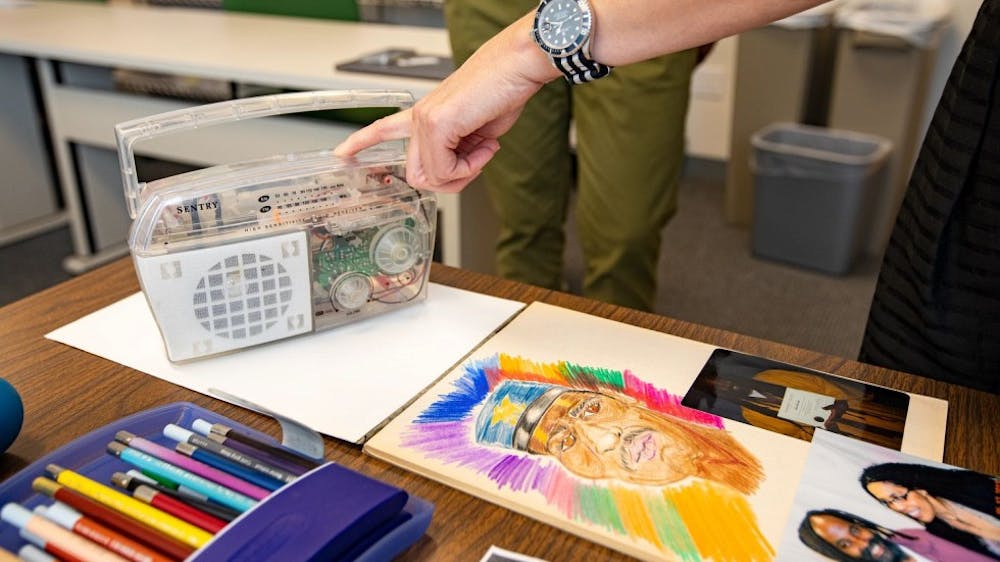An exhibit titled “Mumia Abu-Jamal: A Portrait of Mass Incarceration,” will be displayed across campus in the John Hay Library, the John D. Rockefeller Jr. Library, the Center for the Study of Race and Ethnicity in America and the Ruth J. Simmons Center for Slavery and Justice starting Sept. 28. The collection of writings and other materials from Mumia Abu-Jamal — who is currently serving a life sentence — will shed light on the impact of prison on both incarcerated individuals and their loved ones, according to a University press release.
Abu-Jamal was convicted of the murder of a police officer in 1982 and sentenced to death row in 1983. Though his death sentence was overturned in 2001, he is now serving a life sentence in Pennsylvania, raising questions about racial injustice and the ethics of the death penalty.
Pembroke Center Archivist Mary Murphy initially came across Abu-Jamal’s collection as she was gathering materials for an exhibit centered on women with a connection to the University. Johanna Fernandez ’93, a history professor at Baruch College, was one of the women Murphy contacted for the exhibit, and Murphy soon discovered that Fernandez had a large historical collection of her own which included Abu-Jamal’s papers.
“I knew we were absolutely dealing with a significant collection in terms of research value and that we should pursue this collection,” Murphy said.
Murphy began figuring out a plan to transport dozens of boxes of papers from New York City to Providence. The two-year-long process included complicated communications between Murphy and Abu-Jamal in order to ensure that both Abu-Jamal and Fernandez agreed with the timeline of the collection’s acquisition, The Herald previously reported.
“It was very difficult to get in contact with Abu-Jamal due to his situation, but Johanna Fernandez was incredibly helpful with being a contact throughout the process,” Murphy said.
Fernandez emphasized that the Abu-Jamal archive is “the only archive of its kind in the country.”
“The Abu-Jamal collection may be the only large-scale personal collection of a currently incarcerated American available in a research library,” Murphy said.
The collection’s rarity contributes to its research value. While incarceration is a contentious political topic, Murphy said that the papers were acquired in order to help researchers learn and “create new knowledge” on the subject rather than work through a “political lens.”
The display will also be the first time any of Abu-Jamal’s papers have been available for public viewing.
The Herald previously spoke to Abu-Jamal about the importance of treating incarcerated people as real, “thinking (and) feeling human beings. They have something to say and something to share outside of the cells, outside of the brick and stone and steel and mortar.”
Murphy shared that the Hay plans to begin collecting more documents and materials to spread awareness around incarceration as a part of a larger initiative called “Voices of Mass Incarceration in the United States.”
There will also be an accompanying symposium taking place Sept. 27-29 titled “Voices of Mass Incarceration: A Symposium,” which will include performances and conversations around law enforcement, medical care in prisons, public art and the impact of incarceration on women, according to the University press release.
The event will also feature a women-led keynote address at Fernandez’s suggestion, Murphy said. Four women who have advocated for Abu-Jamal, including academic and activist Angela Davis, were selected by Fernandez to mark the opening of the collection. Nicole Gonzalez Van Cleve, associate professor of sociology, also assisted with organizing the symposium.
“It is so important that Brown recognizes Mumia Abu-Jamal and his impact on raising awareness about incarceration,” Van Cleve said.
The exhibit opens at 4:30 p.m. on Sept. 28 at the Hay and will be on display until July 2024, according to the University announcement.





